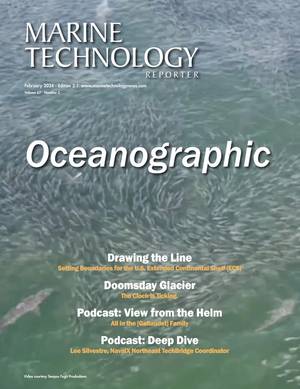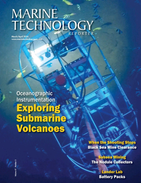The XPrize is seeking to incentivize innovation to spur a new era of ocean discovery, as Jyotika I. Virmani, Ph.D. explains.
We are living in an age of rapid innovation. Over the past 150,000 years we have evolved primarily in a local and linear world where most of our activities happened within a day’s walk. Life was relatively constant, millennium to millennium. The Industrial Revolution and the advent of the Steam Engine saw a shift from this predominantly arable and local lifestyle, to an era of global exploration.
But approximately 70% of the world still remained out of reach. The ocean, with its harsh, opaque saltwater, eluded the rapid pace of exploration and discovery we saw on land. But today, this is changing, and it is changing at an increasingly rapid pace.
Our world is not linear and local anymore, it is exponential and global. The power and capabilities we have with the technology that we use is doubling every year. For example, in the 1950s, our data storage capability was 5 MB at a cost of $120,000. In 2005, 128 MB cost $99. Today, we can purchase 128 GB for $40, with Terabyte storage capacity becoming the new norm. Today’s average low end computer calculates at a rate of 1011 calculations per second – about the equivalent capacity of the brain of a mouse. Scientists estimate that we are rapidly approaching the rate of calculations needed to equal that of the human brain (1016 calculations per second). As faster computers help us design better technologies, we can incorporate these technologies into our lives and have a substantial potential impact on changing our lives for the better.
As technology gets faster, cheaper and smaller, a single individual can have access to things today that only the biggest governments had access to in the past. We are seeing exponential advances in sensor technologies, artificial intelligence, robotics, synthetic biology, virtual reality, 3D printing to name a few. Collectively, we are poised to be able to address some of the greatest challenges we face through these advances in technology. In keeping with innovations in other fields, marine technology has also been evolving rapidly and will continue to do so as more of these exponential technologies are adapted for use in the marine environment.
Less than 5% of the ocean has been explored, but with exponential technologies on the rise, we can look forward to changing that in the next few years. Imagine a world where we know, with the same level of detail, what is at the bottom of the ocean as we know what is on land.
Prizes have long been used as a mechanism to incentivize the development of breakthrough technologies to tackle grand challenges and address market failures. For example, in 1714, the Longitude Prize resulted in the marine chronometer; in 1795, a Prize offered by Napolean for food preservation resulted in the canning process; the Prize offered in 1919 by Raymond Orteig kick-started the private aviation industry; and, the Ansari XPrize won in 2004 started the private space flight industry, now valued in excess of $3bn.
The Shell Ocean Discovery XPRIZE, launched in December 2015, is a $7 million competition incentivizing teams to develop autonomous technologies for high-resolution deep-sea floor mapping and high-definition imagery. One of the recognized market failures in mapping the deep-sea (or, in fact, in collecting any meaningful and extensive data at scale from the deep-sea) has been the expense of operating vessels at sea. The Shell Ocean Discovery XPrize is allowing only shore-based and aerial deployments; encouraging innovations in existing deployment techniques and incentivizing the development of emerging air-sea drone technologies. Such technologies will provide us faster and easier access to areas that are remote from the coast. Another area where exponential technologies are being encouraged for adaptation to the marine environment is in imaging. How we view an object and capture it for posterity is evolving rapidly as virtual reality, augmented reality and 3D printing become more prevalent.
Included in the Shell Ocean Discovery XPrize is a National Oceanic and Atmospheric Administration (NOAA) $1 Million Bonus Prize, to develop pioneering technology that can autonomously track an underwater biological or chemical signal to its source. Merging possible advancements in lab-on-a-chip, in material sciences and in artificial intelligence, such underwater robots could be deployed from the shore in the future on search missions to locate hydrothermal vents, biological hotspots or even find planes and vessels lost at sea.
The Shell Ocean Discovery XPrize is part of the XPrize Ocean Initiative – a commitment that XPrize made to launch five ocean prizes to incentivize the development of technologies we need to put us on an unstoppable path to a healthy, valued and understood ocean. In 2010, within 15 months of the launch of the Wendy Schmidt Oil Clean-Up XChallenge, numerous technologies were developed that could clean up oil at least three times faster than before the competition.
In 2013, the Wendy Schmidt Ocean Health XPrize was launched for accurate and affordable pH sensors. Within 22 months of launch, deep-sea tests to depths of 3,000m were successfully conducted on the 5 final sensors (until then, most pH sensors operated at a maximum of 2,000m depth).
Prizes are being offered by others too. The World Climate Research Programme and Prince Albert II of Monaco Foundation announced the Polar Challenge to incentivize autonomous underwater sensing capabilities under ice. On the 300-year anniversary of the original Longitude Prize, the New Longitude Prize was launched to address the issue of antibiotic resistant drugs.
XPrize is currently running an additional six XPrize competitions to spur technology in the fields of artificial intelligence, education, environment, medicine and space.
It is exciting to be living in a time when the pace of innovation will allow us to fully explore our planet and beyond. This truly is a new era of ocean discovery.
About the Author
Dr. Jyotika Virmani is a Senior Director for Energy and Environment at the XPRIZE Foundation and leads the Shell Ocean Discovery XPRIZE. Dr. Virmani has over a decade of professional experience in oceanography. She has a PhD in Physical Oceanography and a MS in Atmospheric Science.
•  February 2024
February 2024


